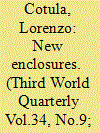| Srl | Item |
| 1 |
ID:
099337


|
|
|
|
|
| Publication |
2010.
|
| Summary/Abstract |
The multifaceted engagement between India and the European Union (EU) has grown exponentially in recent years, leading to a strategic partnership, which is one of the three that the EU has in Asia. Based on a content analysis of three prominent Indian newspapers, which were monitored on a daily basis for a period of 6 months (1 July-31 December 2009), and interviews conducted with political, business, media, and civil society "elites," this article seeks to analyze and assess the perceptions of the EU in India.
|
|
|
|
|
|
|
|
|
|
|
|
|
|
|
|
| 2 |
ID:
086402


|
|
|
|
|
| Publication |
2009.
|
| Summary/Abstract |
The paper examines Malaysia-Japan relationship during the Mahathir era.Malaysia's foreign policy towards Japan is largely driven by the demands of its economy.Mahathir remained pragmatic in his approach and made use of Japan's strengths and weaknesses to Malaysia's advantage.
|
|
|
|
|
|
|
|
|
|
|
|
|
|
|
|
| 3 |
ID:
124927


|
|
|
|
|
| Publication |
2013.
|
| Summary/Abstract |
Seven decades after its first publication, Karl Polanyi's The Great Transformation remains one of the most insightful readings about the socioeconomic changes associated with the Industrial Revolution, and the ways in which law facilitated, or countered, moves towards the commodification of land at that time. As today's global land rush brings competing land claims into contest, new transitions are occurring between more commodified and more 'socially embedded' conceptualisations of land. Using Polanyi's framework, this article analyses the role of international law in these processes. International investment law construes land as a commercial asset, can facilitate access to land for foreign investors and imposes discipline on the exercise of regulatory powers in land matters. But shifts in the political economy that underpins international investment law and growing recourse to international human rights law are creating new opportunities for reflecting the non-commercial (cultural, social, political) relations within which land rights remain embedded in many societies. When contrasting conceptualisations of land collide, the relative strength of legal rights and enforcement mechanisms become particularly important. Ultimately, the legitimacy of international law to mediate between competing land claims will depend on the extent to which it can recognise the multiple values that society attaches to land.
|
|
|
|
|
|
|
|
|
|
|
|
|
|
|
|